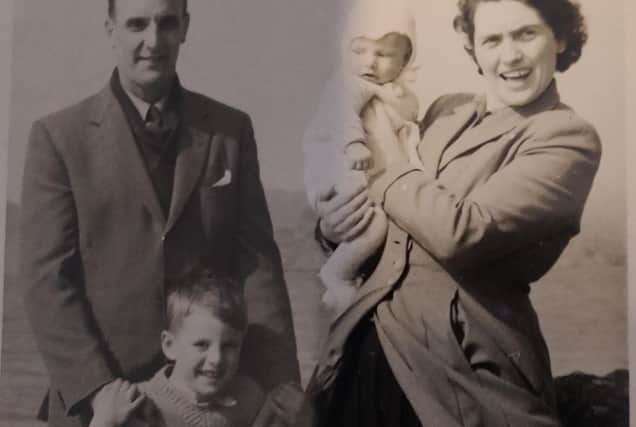Ness connections of Moderator-Designate


Iain MacLeod Greenshields was then 24 and had been a very typical “Glasgow Highlander”, spending every available holiday in Ness. He says an encounter with Rev. John Ferguson, then Church of Scotland minister in Ness, “was fundamental to my call to the ministry”. He went on to Glasgow University to study Divinity.
The Moderator-Designate’s mother, Katie MacLeod, was from 3 Port of Ness. She was orphaned when just six; her mother died from pneumonia in childbirth while pregnant with twins and her father from tuberculosis, a scourge of Lewis in the 1930s. Katie was brought up by her grandmother and left Ness at 14 to work in Glasgow.
Advertisement
Advertisement
Iain’s father was a police officer and for 25 years a member of Glasgow Police Pipe Band, travelling extensively at home and abroad. He too was a Gaelic speaker, born in, and for a while, growing up in the Skye crofting community of Camuscross, which had been his mother’s home. His father was from Lochgilphead.
It was in the Church of Scotland in Cross, Ness, that the Moderator-Designate met his wife Linda. She was on holiday with a friend from Dell. The couple have six children, the three youngest having been adopted from China. In 2005, the Greenshields set up a charity called Hope4China's Children which provides education, support and medical care for around 800 girls in Guangxi Province.
Linda is currently a Religious, Moral and Philosophical Studies teacher at Levenmouth Academy in Buckhaven, Fife.
If the next Moderator’s island credentials are beyond doubt, so too are his urban ones. He grew up in Drumchapel at a time when most of the original occupants came from Glasgow’s grim housing conditions with no inside toilets to new homes that were “palatial” by comparison. The Greenshields were in a “police hub” of six families.
Advertisement
Advertisement
Iain’s first parish after ordination in 1984 was in Cranhill, close to Easterhouse, and after nine years moved to Larkhall in Lanarkshire, where he worked to build ecumenical relations. He was also chaplain to Shotts prison and Lochriggend Young Offenders Institute, which added substantially to his insights into Scotland’s social realities including the failings of the penal system.
In 2002, Rev Mr Greenshields moved to gentler pastures, the charges of Kensaleyre, Uig and Arnisort in Skye. There, he spent “five very happy years” and valued the opportunity to connect with Skye which in earlier years, due to the strength of his Ness connection, “hadn’t really been part of our lives”. During five years there, he served as hospital chaplain and as Moderator of Lochcarron and Skye Presbytery.
In 2007, he was called to St Margaret's Community Church in Dunfermline and held various roles within the Presbytery of Dunfermline including Moderator and clerk. He was also greatly involved in merging three presbyteries into a single Fife Presbytery and expects similar mergers to continue around Scotland under his Moderatorship.
With such a diverse wealth of background experiences, Rev. Mr Greenshields believes that the Church of Scotland now has to make “critical decisions not just about ministers and buildings but also about mission.”
Advertisement
Advertisement
He said: “The Church didn’t realise how fundamentally society was changing around it. There was still an idea that people would come to us. Instead, we need to do a lot more outreach work, not just in an evangelistic way but also by using the Church presence and facilities to connect with people and meet their needs”.
For example, he points to the food table provided by his church in Dunfermline which around 40 people come to every day, in order to feed their families. It is this kind of practical work that he would like to see the church much more closely associated with.
He says: "We cannot force people to believe but we can make belief relevant, understandable, attractive and real to people”.
The Moderator-Designate’s views on drugs policy have been widely publicised and are based on his first-hand contacts with both poor communities and the penal system. His conclusion is unequivocal: “Penalising people for being on illegal drugs is never going to work. It just pushes them deeper into a life of petty crime.
Advertisement
Advertisement
“Poor kids steal to buy drugs and go to jail when caught. Better-off kids steal from their parents to buy drugs and don’t suffer the same penalty. If the same money – and it is a considerable sum – that’s spent on imprisoning wee boys from seriously disadvantaged backgrounds was spent instead on supporting them, far better results would be achieved.
"It will require extensive investment in services but I firmly believe that if you can send someone to prison for a year, why can't you send them to rehab for the same length of time as an alternative?"
While generally supportive of treating drugs primarily as a public health issue, he stresses: “I have no problem with the big boys who supply the drugs being put behind bars for a long time”.
Apart from a clear commitment to social issues, much of the Moderator’s role will be ambassadorial and Iain Greenshields will carry out visits to Presbyteries and congregations around Scotland as well as abroad. He says: “I would hope that a short visit to Ness might be possible”